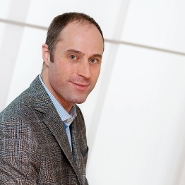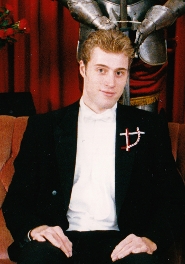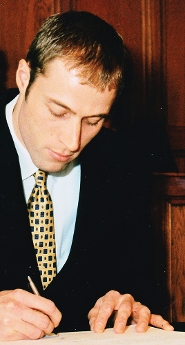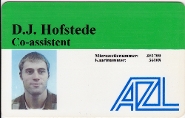
Plastic surgeon Diederik Hofstede: ‘I like small scale'
After studying medicine in Leiden, Diederik Hofstede specialised in plastic surgery. 'I was attracted by its creativity and I enjoy working with my hands.' Cosmetic surgery is just 5% of the work.'
Piecing together a new ear

Hofstede was won over by plastic surgery when he did an internship at the ear, nose and throat department in Gouda. One of the patients had a misformed ear. The ENT specialist and the plastic surgeon together treated the patient, with the plastic surgeon piecing together a new ear from tissues taken from elsewhere in the patient's body. 'I was fascinated by it. It's fantastic to think up such creative solutions. It often involves a lot of handiwork; you're using screws and saws, for example. I've always liked working with my hands.'
Open application
Leiden didn't offer a specialisation in plastic surgery so Hofstede wrote open applications to medical centres that did. 'A plastic surgeon in the AMC recognised my enthusiasm and I was able to take the programme there.' Hofstede then worked at the Gelderse Vallei hospital in Ede and the BovenIJ Hospital in Amsterdam North. He wasn't so keen on the last of these. 'I wanted to get out of the Randstad; it's the busiest part of the county.' So he went to work in the east of the country. After standing in for a colleague in the Queen Beatrix Hospital in Winterswijk for a while, in the spring of 2016 he started a new practice at the Röpcke-Zweers hospital in Hardenberg. It was a pioneering move as the hospital had previously had no plastic surgeon.
Not interested in the big city
‘I've always preferred things on a small scale. I grew up in Leiderdorp and Leiden and went to school at the Stedelijk Gymnasium. I really liked it there. After that I wanted to have my own place, but I wasn't interested in going to a big city. Leiden is a historic city and it's also compact, which is perfect for me. And I did basketball in Leiden at a high level at BS Leiden, now ZZ Leiden, now and then in the premier league. I was able to carry on doing that.'
Fountain of knowledge
When asked which of the skills he learned in Leiden he still uses, he was silent for a moment. 'The programme generated a lot of knowledge that you were expected to assimilate. I can't say I really got into the academic skills. That only came later, when I was specialising at the AMC. That's when you had to be very critical in evaluating your own work.’ That doesn't mean that Hofstede's student years weren't a formative period. 'It was a wonderful time; I learned to stand on my own two feet, with my parents as a safety net in the background. I didn't have any great needs, so I could manage on little money, and I discovered a lot about myself and the world - close by and also far off.’

studievereniging van de Faculteit
Geneeskunde.
Richmond, Virginia
Hofstede left Leiden for a year to study at the Virginia Commonwealth University Medical School in Richmond, US: to play basketball there to get some international experience and to take some interesting programmes - more or less in that order of priority. He had several different part-time jobs in Leiden: cleaner and doorman at the then famous Leiden student disco Koets-O-theek, and security guard and porter at the hospital. That was a 2-in-1 job: the porters would take patients to the right department, deliver materials and even take cadavers to the mortuary. At that time the Leiden Academic Hospital consisted of separate buildings. Hofstede felt at home in that small and friendly environment. The Poort building near to the LUMC is a remnant from that time.
Cosmetic surgery
The – literally – most visible aspect of plastic surgery is cosmetic surgery, but that's only just 5% of the work of a plastic surgeon. Most of the work, around 50%, goes into hand and wrist operations and reconstructions. There's also the repair of genetic defects, breast operations and reconstructions, operations on the ears, eyelids and nose. 'Actually, all the body's defects,' Hofstede says. 'The great thing about our specialism is that it's often possible to look for a solution in different directions. That's what makes it so creative. You have to work out which solution or combination of options is best for the patient.'
Protected title
At the time of the interview with Hofstede it had just been made known that plastic surgeons feel that there are too many inexpert interventions by untrained cosmetic surgeons. 'Our professional body is now looking at how prevalent that is,' Hofstede comments. He explains: 'Anyone with a basic medical degree can work in any medical discipline, because they are qualified for everything. The point of following a specialisation is to become skilled in that field, but it's not absolutely necessary according to the letter of the law. Specialists' titles are protected. A non-specialist doctor may not call himself a plastic surgeon.'

Qualified, but not competent
According to Hofstede, what you see in practice are cosmetic doctors who are qualified but not competent. 'There are hardly any problems with botox, but there are with what's known as 'fillers'. Our professional body has recently banned permanent fillers. A person's body has to be able to break down the substances used. That rule is sometimes ignored, which can result in a lumpy skin and even pain. In my training I learned never to do anything if you aren't able to rectify the consequences yourself. Since the advent of market competition, I've been coming across all kinds of anomalies: GPs who carry out eyelid corrections, and dental surgeons who do facelifts, to name a couple. And these operations don't always end well.'
Win-win situation
The hospital landscape has also changed enormously. The Beatrix hospital where Hofstede worked now has its own cosmetic clinic that looks just as chique as a private clinic. This is where cosmetic treatments are carried out that are not funded by health insurers. 'It's a win-win situation,' Hofstede explains. 'The hospital benefits financially and the client or patient has the guarantee of a specialist plastic surgeon at the bedside. This type of clinic can also remove varicose veins if the operation isn't covered by health insurance.' Hofstede is also considering setting up a similar clinic at the Röpcke-Zweers hospital.
Rabbits, goats and horses
Hofstede lives with his partner and their two daughters aged 11 and 12 in Het Gooi. He also has a daughter with his first wife. His partner has two children of her own who no longer live at home. The other family members are a puppy, two rabbits and several hamsters. If they move to a farm in the east, as they would like to do, they will have even more animals, such as goats and horses. 'I love that it's so rustic and friendly here.'
(CH)
Who: Diederik Hofstede (46)
Studied: Medicine (1990-1998); specialised in plastic surgery at the University of Amsterdam
Member (student association): ‘No, but I was a member of the basketball club BS Leiden – now ZZ Leiden. Great fun.’
Favourite spots in Leiden: ‘There are so many. When I cycled along the Breestraat, I immediately felt at home in Leiden, with so many familiar places close by, such as Kooyker's book shop. And then there are the Hooigracht where I used to live, and De Grote Beer café, where I proposed to my first wife. The Koets-O-theek and Annie’s Verjaardag were also firm favourites. And the 3 October fair and the National Museum of Antiquities, where I like to take the children.
